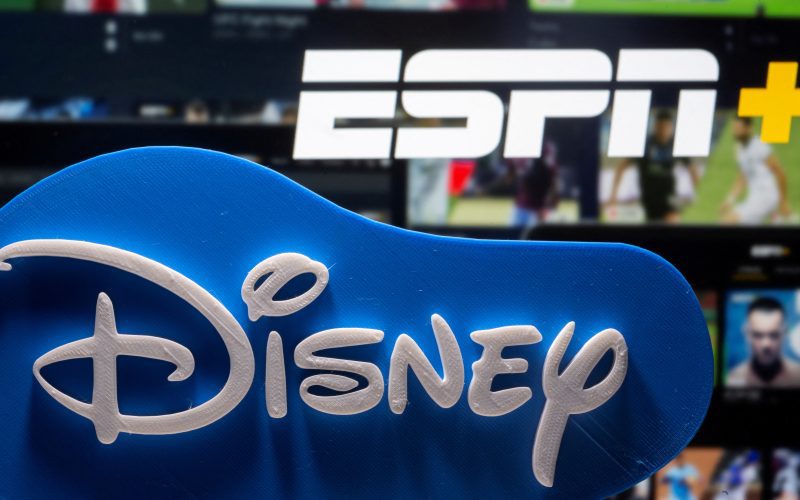In a tumultuous turn of events, Disney’s stock faced a staggering decline of 9.5%, despite the company’s remarkable achievement of securing its first-ever profit in its core streaming business. This unexpected drop in share value rattled investors and sparked concerns about the entertainment giant’s future trajectory.
Feature Story

Amidst the glitz and glamour of Disney’s roaring success in the streaming sphere, the recent nosedive in its stock value has cast a shadow over the House of Mouse. While the company has been riding high on the wave of its streaming platforms, including Disney+ and Hulu, Wall Street’s response appears discordant with the company’s narrative of triumph.
Industry analysts attribute this sharp decline to a confluence of factors, including market volatility, concerns over subscriber growth, and broader economic uncertainties. Despite Disney’s robust earnings report, which showcased an impressive surge in revenue from streaming services, investors seemed apprehensive about the sustainability of this momentum.
The streaming landscape has become increasingly
competitive, with rival platforms vying for a larger slice of the digital entertainment pie. Disney’s foray into the streaming arena was initially met with enthusiasm, but as the novelty wears off, shareholders are scrutinizing the company’s ability to maintain its competitive edge amidst fierce competition from tech giants like Netflix, Amazon, and newcomer entrants.
Moreover, lingering apprehensions about the recovery of Disney’s traditional revenue streams, such as theme parks and theatrical releases, in the post-pandemic era have added to the market’s unease. The resurgence of COVID-19 variants and the uncertainty surrounding global travel have raised doubts about the pace of Disney’s recovery outside the digital realm.
Despite these challenges, Disney remains steadfast
in its commitment to innovation and content creation. The company’s recent announcements, including plans to expand its streaming offerings with original content and strategic partnerships, reflect its determination to stay ahead in the ever-evolving entertainment landscape.
As Disney navigates through this turbulent phase, the coming months will be pivotal in determining its resilience and adaptability in the face of adversity. The House of Mouse may have stumbled, but its legacy of creativity and storytelling endures, serving as a beacon of hope amidst uncertain times.
Opinion Piece
The recent plunge in Disney’s stock price underscores the capricious nature of financial markets and the inherent volatility of the entertainment industry. While investors may be fixated on short-term fluctuations, it’s essential to recognize Disney’s enduring appeal and long-term growth potential.
Disney’s success in the streaming arena is a testament to its ability to pivot and innovate in response to changing consumer preferences. The company’s iconic brand, coupled with its vast library of beloved franchises, positions it as a formidable player in the digital content space.
However, the market’s myopic focus on quarterly earnings often obscures the broader narrative of Disney’s evolution as a multimedia powerhouse. Beyond the fluctuations of the stock market lies a company with a rich legacy of storytelling, creativity, and cultural impact.
In the midst of uncertainty, investors would be wise to adopt a more nuanced perspective on Disney’s prospects, recognizing the intrinsic value of its brand and the resilience of its business model. While short-term setbacks may dampen sentiment, the magic of Disney endures, promising a future filled with imagination, innovation, and possibility.
Research Techniques and Ethical Considerations
When reporting on breaking news such as the decline in Disney’s stock price, it’s crucial to employ rigorous research techniques to verify information and uncover reliable sources. This involves consulting reputable financial sources, analyzing market trends, and seeking insights from industry experts to provide a comprehensive understanding of the situation.
Moreover, adhering to journalistic ethics is paramount in maintaining integrity and credibility in reporting. This includes ensuring accuracy in facts, avoiding sensationalism or bias, and presenting a balanced perspective that reflects diverse viewpoints.
Visual Table for Key Points:
| Key Points | Details |
|---|---|
| Disney’s Streaming Profit | First profit in core streaming business despite market dip |
| Market Reaction | Disney shares fall 9.5% amidst broader market volatility |
| Streaming Landscape | Competition with Netflix, Amazon, and emerging platforms |
| Factors Driving Success | Content diversity, subscriber growth, international expansion |
| Investor Strategies | Long-term investment vs. short-term fluctuations |
| Expert Recommendations | Diversification, monitoring industry trends, strategic buys |
Comparative Table for Streaming Platforms:
| Platform | Monthly Price | Original Content | Subscriber Base (millions) |
|---|---|---|---|
| Disney+ | $7.99/month | Marvel, Star Wars, Pixar | 150 |
| Netflix | $12.99/month | Stranger Things, The Crown | 214 |
| Amazon Prime | $12.99/month | The Marvelous Mrs. Maisel, The Boys | 200 |
| HBO Max | $14.99/month | Game of Thrones, Friends | 67 |
In covering stories related to publicly traded companies like Disney, journalists must exercise caution to avoid disseminating misinformation or speculation that could impact financial markets. Verifying information with multiple sources and cross-referencing data helps mitigate the risk of inaccuracies and ensures responsible reporting.
By upholding the principles of accuracy, fairness, and transparency, journalists play a vital role in informing the public and fostering informed discourse on matters of public interest, including the financial performance of companies like Disney.












